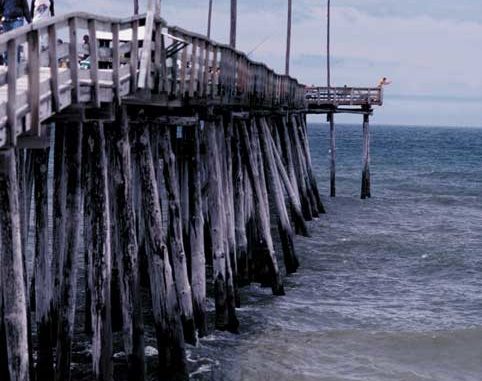
OBPA’s suggestion that Cape Hatteras National Seashore user groups talk to each other may result in rules with something for everyone.
Put together some people with some facts, other people with other facts, lots of people without facts but plenty of opinions, and people with the responsibility of getting them to agree on anything and one may sense the conundrum facing the managers of the Cape Hatteras National Seashore.
After seeing what the Outer Banks Preservation Association has accomplished, Americans who love to visit these remote stretches of barrier islands need to tip their hats to John Couch and Dave Goodwin for keeping sport fishermen in the forefront these past 30 years.
People have fought for decades about access to national seashores. A number of issues have bubbled to the top, mostly pitting user groups against each other.
Federal biologists wanted beaches closed during breeding seasons to build up populations of protected nesting birds and sea turtles. Fishermen said they could fish without interfering with protected species. But the feds didn’t believe the anglers’ assertions.
For a long time, nobody was talking about compromise or negotiations, and few knew the difference.
Compromise has been described as meeting an opponent part way, with each side giving up enough to get the other to agree to a middle ground. Negotiation is restating each side’s position in various ways in an effort to find a common path wherein each side achieves its goals. At its best, negotiation may involve giving up nothing and getting what each side wants in a different manner.
In today’s climate of conflict, few remember it was President Richard Nixon who initiated key environmental landmarks, including the Environmental Protection Agency and Endangered and Threatened Species Act.
The ESA impacted N.C. surf and commercial fishermen, who are major beach users. Then other users got into the conflict, including surf fishermen wanting to drive the beaches with ORVs, people wanting to play with their dogs in the giant sandbox, swimmers wanting freedom from hooks in the water and from the noisy folks with jet skis and similar machines that upset all other users.
It was a national problem with similar conflicts at the Cape Hatteras National Seashore taking place at Yellowstone and Grand Canyon and other national parks. Here it was jet skis; there it was snow mobiles.
There was no consensus regarding rights to public beaches, and who was infringing upon whom, nor about whether the parks could accommodate human uses consistent with enforcement of the ESA, binding upon federal agencies and employees.
Presidents Nixon and Jimmy Carter ordered the National Park Service to resolve user conflicts by issuing executive orders. Carter’s (Order 11989) during 1975 demanded the NPS devise an off-road vehicle management plan.
The OBPA (www.obpa.org), not surprisingly, was born that year.
Despite the efforts of OBPA and other groups during the next three years, in 1978 the Manteo NPS office proposed a 50-percent reduction (“Interim Management Plan for Off-Road Vehicle Use Cape Hatteras National Seashore excluding Pea Island National Wildlife Refuge”) in ORV use at the Cape Hatteras National Seashore.
OBPA responded by joining with the N.C. Beach Buggy Association, the Southern Environmental Law Center and other user groups to form a front line to defend all public uses, not just fishing or ORV use, and for holding NPS’s feet to the fire. OBPA demanded data from NPS to support its recommendations.
But the NPS wouldn’t budge, and the users wouldn’t budge.
Then OBPA sought a breakthrough by pushing for “negotiated rule-making,” a formal process widely used in other sectors to bring regulators and the regulated communities together to share expertise and seek resolutions supported by informed stake-holders.
Who was this new group, the OBPA?
John Couch and Dave Goodwin, then in their 20s and now in their mid 50s, are president and director, respectively, of OBPA.
Couch’s family came to the state in the late 1950s, and he moved to the Outer Banks when his U.S. Army colonel father retired in 1964.
In 1977 Couch and two brothers purchased a commercial building at Buxton. Couch operates an auto-parts store at one end of the building today while Bob Eakes manages the famous Red Drum Tackle Shop at the other.
Dave Goodwin of Raleigh had been coming to the Outer Banks since the 1950s and permanently moved to the coast in 1999.
Couch and Goodwin were eager to talk about OBPA and its push for negotiated rule-making, emphasizing they were neither a conservation, fishing nor any other kind of group. They said OBPA solely was concerned with getting users to sit down with the NPS and thrash out solutions.
OBPA urged NPS to engage the professional negotiators at the Consensus Building Institute, which has an impressive track record in resolving complex social questions.
“We’re not opposed to jet skiers or bird-watchers or anyone else using the beach,” Couch said. “It’s getting everyone to work in a mutually respectful way to get a consensus — rather than a rule laid down from on high — that’s at the center of our efforts.
“We know the NPS people agree with us it’s the way to go, but we’re still not sure they’ll be able to take that approach.”
NPS was intrigued and saw OBPA’s suggestion as a course of action that could bring a satisfactory resolution to user conflicts at its most well-known and beloved N.C. coastline park, the Cape Hatteras National Seashore. The worst result would be someone else to take the blame.
The CBI worked with the NPS and U.S. Institute for Environmental Conflict Resolution to put together a team of neutral mediators. These mediators would, as a first step, conduct a feasibility assessment to see if, in fact, all these people and interests would be willing to work together as a committee.
Among the proposed stake-holders were:
• U.S. Fish and Wildlife Service, National Park Service, Cape Hatteras National Seashore;
• N.C. Department of Transportation, N.C. Division of Marine Fisheries;
• Dare and Hyde counties;
• local homeowners’ and civic associations;
• OBPA;
• United Four Wheel Drive Associations, N.C. Beach Buggy Association;
• Recreational Fishing Alliance, Cape Hatteras Anglers Club;
• North Carolina Fisheries Association and;
• Defenders of Wildlife, Environmental Defense, Natural Resource Defense Council, Wilderness Society, and the Southern Environmental Law Center.
In all, 28 seats were filled on the negotiated rules-making committee.
It wasn’t easy, but success is on the way.
During April 2006 the CBI released its recommendation regarding developing an ORV management plan within the Cape Hatteras National Seashore (http://www.cbuilding.org/projects/hatteras/index.html).
OBPA worked hard to push for negotiated rule-making and to get the CBI involved. The NPS acquiesced enthusiastically, and negotiated rule-making began. It seems to be a long-but-worthwhile process.
This past summer, the feds gave notice in the Federal Register of the intent for a Federal Advisory Committee to formulate an ORV plan for the Cape Hatteras National Seashore Recreational Area, then received comments from the public through the end of July.
Since then, three workshops have been held, the last Oct. 22-23 at the Nags Head Fire Hall, where the feds explained the ground rules for “Reg Neg” (negotiated rules-making), its goals, processes and procedures, tools and how it ties into the National Environmental Policy Act — the essential components of a full Reg Neg.
Reg Neg isn’t just an idea, but a formal process that covers all issues to make the legally defensible outcome bullet-proof against unhappy and often unreasonable groups (you can’t please them all) and their lawyers.
The feds described the scope of Reg Neg, how it relates to NEPA and the U.S. Fish and Wildlife Service interim endangered species management plan. Stakeholders were given time to talk about their plans and activities and offered ideas about using regulatory tools used at other national parks to deal with off-road driving impacts.
After question-answer sessions, the draft ground rules were presented, discussed, and the economic impacts of various options discussed. There were more brainstorming sessions where ad hoc groups thrashed out issues and possible solutions.
Then it was over until the next workshop.
Largely with OBPA’s persistence, the outcome should be well-reasoned and discussed, and nobody will steamroller anyone else.
Now these diverse user groups appear ready to talk to each other instead of at one another.
If Washington goes along with the CBI’s recommendations, hopefully the NPS and the Cape Hatteras National Seashore will adopt rules that won’t threaten sea birds and sea turtles nor endanger ORV sportsmen.
It’s likely jet skis will be permitted at some areas, but that should be a small price to pay for a workable plan that will benefit wildlife and sportsmen.
To stay tuned, check the OBPA web site at www.obpa.org and keep up with the U.S. Park Service at http://parkplanning.nps.gov/CAHA.
The system is working at last because the people are no longer being ignored.

